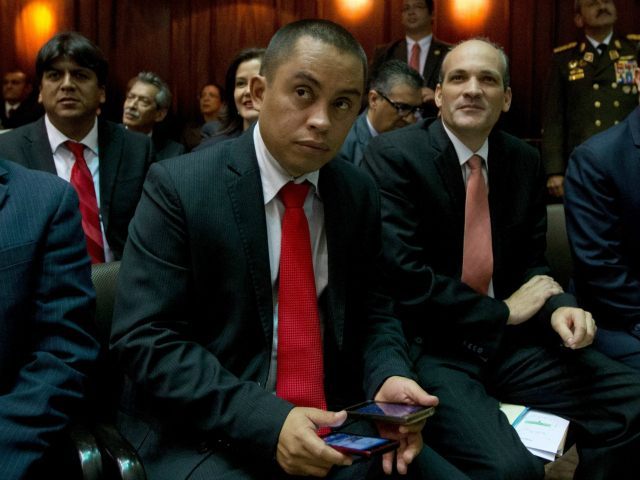Venezuela’s socialist president Nicolás Maduro has replaced his vice president of economy after only a month in office. Luis Salas was considered an “alarming” nomination last month for past statements in which he asserted that “inflation does not exist.”
Maduro announced that Luis Salas was stepping down on Monday, stating that he would “work on other activities on the economic teams directly related to me.” He cited “eminently personal family matters” as the reason Salas was stepping down to make room for a new minister, though he did not specify what sorts of family matters he had to attend to that made him unable to fulfill his duties as vice president.
Maduro has appointed as his replacement Miguel Pérez Abad, a man the New York Times describes as “more business-friendly” and open to private enterprise, which the Maduro regime has stifled even more than predecessor Hugo Chávez in the past three years.
While Maduro made clear the claim that Salas was leaving to spend more time with his family, some have questioned the timing and motivation of the departure. “It reflects the total improvisation on the part of President Nicolás Maduro during his tenure,” former Venezuelan Chamber of Commerce head Jorge Roig said. “It is a bad image for the national government.” He noted also that Salas was considered Maduro’s favorite economic minister so far, and that this economic cabinet was “the first with which he felt comfortable, they were his people,” and their leader did not make it to two months in office.
Salas had most recently appeared on national television to promote a draconian new rule by decree on Maduro’s part, triggered by his designation of a “national economic emergency.” Blaming Venezuela’s economic decline on “the strategy of economic destabilization” on the part of the United States,” Salas told Venezuelans Maduro would now be more able to fight “induced inflation, speculation, and the consequences of the oil wars.”
Inflation is the topic that made Salas an internationally-known name. Upon his appointment in January, essays he had written on economic theory began to surface. “Inflation is used as a tool of political struggle to pressure governments, impose interests, or simply to conspire to make the population desperate, demoralized, and hateful,” he wrote in a pamphlet titled, “22 Ways to Understand and Combat the Economic War,” adding, “inflation does not exist in real life. He also rejected the basic theory of supply and demand in his writings: “Prices do not increase because of the rarity of items, but because of relationships in which those products are produced, which in capitalist economies are mediated by individual lust for wealth through the exploitation of others.”
Weeks after Maduro’s “economic emergency” declaration, rather than improve, Venezuela’s economic situation has significantly deteriorated. The National Assembly, the federal legislature, has declared a “nutritional emergency“: the country has run out of food. The emergency designation allows the legislature to pass bills to import more goods, to ensure supermarkets have enough food to feed most of the country. The decree also allows for inspections of government-owned food corporations, expropriated during the Maduro and Chávez tenures.
The lack of food as triggered waves of violence across Venezuela. Supermarket lines, which often take six or more hours to clear, have devolved into riots and shoppers fight over the last bag of flour or bottle of milk. “This economic war has made us all act like we are in The Hunger Games,” Salas said in January, blaming the United States for the riots. Salas expressed hope that “our great allies” like China would help the country purchase more food. Due to 17 years of socialist rule, Venezuela does not produce enough food to feed itself, though before Chávez, it imported a high percentage of its crop production.

COMMENTS
Please let us know if you're having issues with commenting.